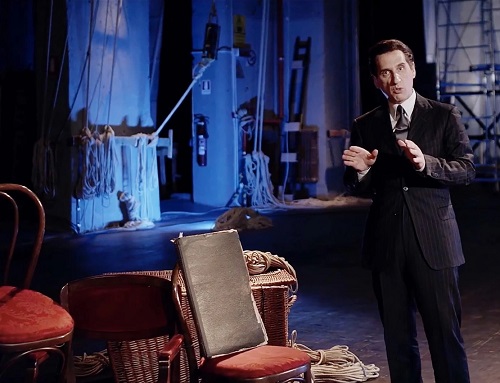George Gershwin is the origin point for Hershey Felder: This origin point opened the door to an inspired career of towering brilliance and precision where he strikingly revives musical legends and more. He returns to his roots in a farewell tour of this inspired one-person show.
By John Lavitt
Beverly Hills, CA (The Hollywood Times) 04-17-2023
“I don’t know that I’m promoting truth, but I’m promoting the notion that we are all worth something. I would like to think that I bring people together and remind us all of our stories. We need to keep telling them, so we don’t forget our humanity.… There is value in doing something that makes the world a better place, not tearing it apart, even if it’s just getting an audience to sing. There’s value in all of this.”
Hershey Felder in a 2016 Interview
According to Hershey Felder and the Wallis Annenberg Center for the Performing Arts, Hershey Felder’s recent run as George Gershwin Alone from April 13th to 16th was his last as the great American composer. Wonderfully directed by Joel Zwick, the show allows the virtuoso pianist/performer/playwright/ producer to shine like a living star while profoundly connecting with an audience fully. Indeed, Felder is moving away from live performances.
If you want to see more of Hershey Felder in his new films and classic roles, please go to https://hersheyfelderpresents.com/ to rent his filmed performances. Sadly, the stage is no longer his home as much as the screen.
It is hard to believe what the maestro proclaims. After this farewell tour is completed, Hershey Felder says he will never again assume the role of his beloved George Gershwin on stage. If you did not know, George Gershwin, the giant of twentieth-century American classical and jazz music, died young, given his stunning accomplishments. Gershwin died of a brain tumor in Los Angeles in 1937 at only thirty-eight years old. Given the size and lethality of the tumor, it is surprising that he lived this long. Throughout his adulthood, beyond being a fount of musical genius, Gershwin was plagued by excruciating and debilitating headaches. Only after his untimely passing did they realize the apparent cause.
Described by American Theatre Magazine as “a seductive portraitist, compelling storyteller, and superb concert pianist,” Hershey Felder is one of a kind. His true career on stage was seeded in 1994 as he briefly worked for what was then the Steven Spielberg Shoah Foundation, now the USC Shoah Foundation. Felder’s knowledge of Yiddish and French was ideal for interviewing Holocaust survivors in the foundation’s efforts to preserve oral histories on film. As part of the foundation, he attended the 50th anniversary of the liberation of Auschwitz in Poland in 1995.
At the Auschwitz ceremony, Felder met Helmuth Spryzcer, and this meeting watered the seeds that had been planted. As a boy, Helmuth Spryzcer was forced to whistle George Gershwin’s Rhapsody in Blue to the German guards in Auschwitz. Deeply moved and creatively stirred by this moment, Hershey Felder created his first one-person show. Sing! A Musical Journey is the story of Helmuth Spryzcer as a holocaust survivor, with Gershwin’s Rhapsody in Blue presented at the conclusion as a melancholy celebration. As the character of Helmuth Spryzcer declares during the impassioned performance, in the music, “You can hear the cries of the dying.”

Opening the door wide and hopefully forever, this first one-person show led to Hershey Felder’s initial razor-sharp focus on George Gershwin. Connecting with the notoriously difficult Gershwin family while researching the composer’s work and life in the Library of Congress, Felder created what is still arguably his most beloved performance. Such a statement is hard to make for a man who has brought so many to life on stage, from Ludwig Van Beethoven and Irving Berlin to Pyotr Ilyich Tchaikovsky and Frédéric Chopin.
Moreover, Hershey Felder has brought these men to life with a wealth of compassion and humanity. Although Russian theatrical producers invited him to bring Tchaikovsky to life, he has refused ever to perform that show in Tchaikovsky’s homeland. Shortly after Felder began his research, the Russian Duma passed anti-gay legislation. Standing by his principles, including the widely-held conviction that Tchaikovsky was a homosexual, Hershey Felder chose only to perform the show in the United States. Indeed, George Gershwin would have been proud.
As a Jewish son of immigrant parents, Gershwin was attacked viciously by American right-wing bigots like Henry Ford and his lot. They referred to Rhapsody in Blue as gutter music written by the rats. Felder underscores how critics and bigots attacked Gershwin throughout his abbreviated life and shows great compassion for the man. Indeed, one of Felder’s most extraordinary talents is to take his audience on a storytelling journey, revealing a subject’s biography with engaging stories and highlights. He invites us to join a narrative constructed of empathy and insight, and we happily take a blessed ride with him.
In the end, Hershey Felder took questions from his audience at the Wallis Annenberg Center for the Performing Arts in Beverly Hills. Once again, his humor and generosity revealed the enduring quality of this artist. As a child, in one ten-month period, Morris Gershwin, George’s father, moved 23 times in a desperate attempt to find his American dream. As Hershey Felder illuminates, although that dream later was realized by his son, all dreams fray at the edges as the harshness of reality invades a sacred haven of creativity and love. Indeed, it feels like this is what Hershey Felder has created for himself in Florence and Paris with his beloved wife.




